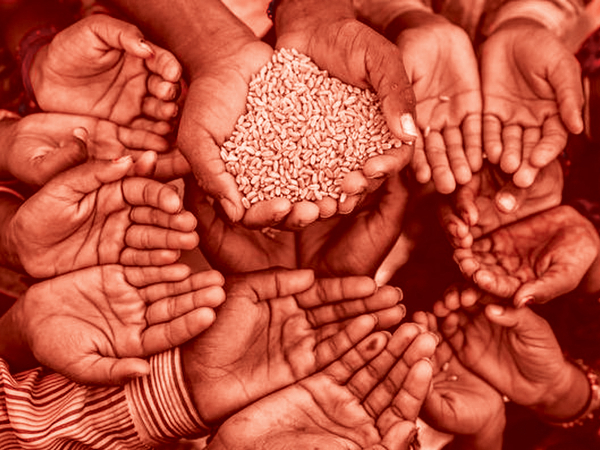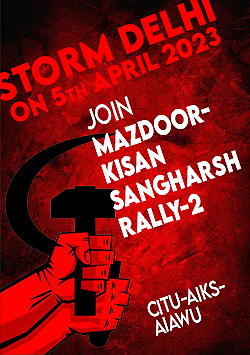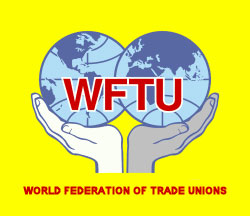Hunger and starvation deaths loom large as food security comes under severe threat!
India is the country with the largest number of people facing chronic hunger. According to Food and Agriculture Organisation (FAO), 22.4 crore people in India suffered from chronic hunger in 2019-21. No other country in the world has such a large number of people facing hunger. As per FAO estimates, about 56 crore people, i.e. 40.6% of the population in India suffered from moderate to severe food insecurity in 2019-21. The proportion of the population that is severely food insecure in the country has risen from 20.3% in 2018-20 to 22.3% in 2019-21. The corresponding proportion for the world was about 10.7% in 2019-21.
India alone accounts for 37% of the world’s total severely food-insecure population.
When Modi came to power in 2014, India was at 56th rank in the Global Hunger Index. The latest Global Hunger Index ranks India at 107th out of 121 countries. The much hyped Modi growth story in the last eight years is actually the growth of hunger, starvation and crony capitalism.
According to the National Food Security Act (NFSA), three fourths of the rural and half of urban population counted in the last census should be covered by the public distribution system (PDS). However, since the last census is more than 11 years old, and the census for 2021 has been delayed, the coverage of PDS has fallen way below the mandated 66 per cent. If one goes by the official population projections, over 10 crore people in the country are excluded from the coverage. Second, since 2014, over 4.4 crore ration cards have been cancelled. This has been done by linking ration cards with the Aadhaar in the name of weeding out duplicate cards.
About 70 per cent of the cards have been cancelled in states ruled by the BJP and its allies, suggesting that the cancellation of original cards and issuing of new cards may have been done with the political motive of creating a class of beneficiaries beholden to the current ruling dispensation.
While the original identification of beneficiaries of NFSA was done through a national socio-economic census, cancellation of cards and inclusion of other households in lieu of them have been done on an ad-hoc basis, without any specified criteria or procedure.
As per the data provided by the government of India, 81.5 crore people were covered by the subsidised food scheme of 5 kg grains per head at Rs.2 /kg for rice and Rs.3/kg for wheat under NFSA.
During the Covid pandemic, the government increased free allocation of 5 kg grain per head to households in addition to the prevailing scheme. Millions of workers lost jobs due to the lockdown and economic crisis. Such households were pushed into food insecurity but none of them were covered under NFSA as the government refused to universalise the public distribution system.
The recent decision to merge PMGKAY with NFSA is in reality a decision to reduce the entitlement of NFSA beneficiaries back to 5 kg of grain per person per month.
On the basis of a Cabinet decision, the Union Government had stopped the subsidised grain since 1st January 2023 and announced the free ration of 5 kg per person to continue for another one year.
As per the scientific norms accepted by the Indian Labour Conference, bare minimum of 2700 k calorie is required for sustaining the life of a person. Thus, 400 gm of rice and 100 gm of dal is essential per day for consumption. It necessitates 12 kg of rice and 3 kg of dal per person for a month. For a family of five-person 60 kg of rice and 15 kg of dal is required.
The decision of the Narendra Modi government to stop subsidising grain has affected poor families by forcing them to depend on the open market to purchase the remaining 35 kg of rice and 15 kg of dal by paying minimum Rs. 36 and Rs. 80 per kg respectively. This will cost these families Rs.1260 for rice and Rs.1200 for dal, i.e., Rs.2460/ per month.
In the context of this huge cut in food subsidy, the Union Budget 2023-24 has curtailed Rs.90000/crore from the allocation compared to the last year Budget. This is a brutal attack on the poor people of the country.
Neo-liberal policies of the Union Government deny minimum wage to workers and minimum support price to farmers pauperising them and pushing them into absolute poverty.
By negating the right to food security, the policies of the Modi led BJP government are leading towards a situation where starvation deaths loom large. The peasants, agricultural workers and the workers who produce the wealth of this country are thus forced towards starvation and deprivation while the Super Rich and the big corporates including foreign monopoly companies are provided lakhs of crores of rupees worth tax concessions and reliefs.
The Mazdoor Kisan Sangharsh Rally on 5th April 2023 is to warn the Modi led BJP government that these policies are not acceptable to the peasants, agricultural workers and workers of this country. It is the beginning of a struggle for pro worker, pro peasant and pro people alternative policies.
Come, Let us join en masse!



